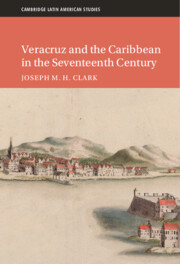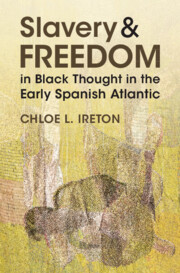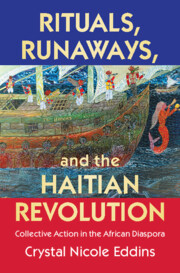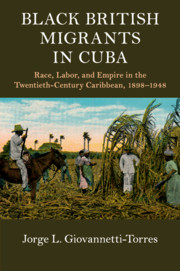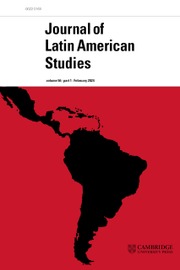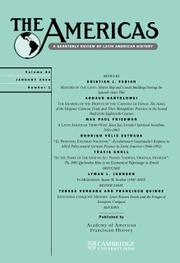Veracruz and the Caribbean in the Seventeenth Century
In the seventeenth century, Veracruz was the busiest port in the wealthiest colony in the Americas. People and goods from five continents converged in the city, inserting it firmly into the early modern world's largest global networks. Nevertheless, Veracruz never attained the fame or status of other Atlantic ports. Veracruz and the Caribbean in the Seventeenth Century is the first English-language, book-length study of early modern Veracruz. Weaving elements of environmental, social, and cultural history, it examines both Veracruz's internal dynamics and its external relationships. Chief among Veracruz's relationships were its close ties within the Caribbean. Emphasizing relationships of small-scale trade and migration between Veracruz and Caribbean cities like Havana, Santo Domingo, and Cartagena, Veracruz and the Caribbean shows how the city's residents – especially its large African and Afro-descended communities – were able to form communities and define identities separate from those available in the Mexican mainland.
- Combines Mexican, Caribbean, and Atlantic perspectives to examine social and cultural development
- Sheds light on the importance of Veracruz and the wider significance of Mexico and its role in the Atlantic World
- Blends environmental, economic, social and cultural history to decenter colonial ideologies embedded within archives and provide new ways of thinking about the African diaspora and identity construction
Awards
Honorable mention, 2024 Bandelier/Lavrin Book Prize, Rocky Mountain Council for Latin American Studies
Reviews & endorsements
‘In this deeply researched and original book, Joe Clark argues for a distinct Mexican-Caribbean urban history. Africans and their descendants formed the majority population of seventeenth century Veracruz; Clark sheds light on their social, cultural, and economic roles in Veracruz and the circum-Caribbean networks of Havana and Cartagena. An important contribution to Mexican, Caribbean, and Atlantic World histories.’ Jane Landers, author of Atlantic Creoles in the Age of Revolutions
‘This richly documented history of Veracruz gives new meaning to the bound waters of the Gulf of Mexico and the Caribbean Sea. Joe Clark demonstrates the utility of seeing beyond the lines drawn on imperial maps to understand the web of relations that connected Afro-diasporic communities. It is an exceptional achievement.’ Tatiana Seijas, author of Asian Slaves in Colonial Mexico: From Chinos to Indians
‘This excellent, long-awaited study breaks new ground by examining seventeenth-century Mexico in relation to the Spanish Caribbean. Creatively employing an impressive range of disparate sources, Clark opens multiple new ways of envisioning early colonial Veracruz as a Black and Caribbean space.’ David Wheat, author of Atlantic Africa and the Spanish Caribbean, 1570–1640
‘…Clark has produced a dynamic history of seventeenth-century Veracruz. Crucially, by moving beyond the geographic framings privileged by elites, he demonstrates the importance of regional, granular perspectives for uncovering the experiences of individuals, especially those of African descent, within a multifaceted Caribbean world.’ Casey Schmitt, Hispanic American Historical Review
‘… a very welcome contribution to Latin American historiography.’ Ramona Negrón, International Journal of Maritime History
‘Clark’s monograph makes a meaningful contribution to the historiographies of New Spain, as well as the Caribbean. His conclusion centers on a map that characterizes the Caribbean as the Mexican archipelago, forcing scholars to think about geography and the ways persistent classifications can - and should - be challenged.’ Keith Richards, The Latin Americanist
‘This book … forges an original, strategically documented approach to a node connecting Caribbean commercial circuits to the Viceroyalty of New Spain (Mexico). Intelligently and creatively drawing upon archival documentation from diverse repositories, [it] exemplifies the cis-Atlantic approach to history. It engages and enriches recent scholarship, with especially significant attention to the meanings and persistence of ethnic identifications.’ Bethany Aram, American Historical Review
Product details
January 2023Hardback
9781009180313
344 pages
235 × 156 × 25 mm
0.66kg
Available
Table of Contents
- Introduction
- Part I. Building the Mexican-Caribbean World:
- 1. Veracruz before the Caribbean
- 2. Environment, health, and race, 1599–1697
- 3. Imperial designs and regional systems
- 4. The large- and small-scale introduction of Africans to Veracruz
- Part II. The Caribbean in Veracruz:
- 5. After the slave trade: nation, ethnicity, and mobility after 1640
- 6. Practice and community in a spiritual borderland
- 7. Caribbean defenses, the free-black militia, and regional consciousness
- Conclusion: the Mexican Archipelago
- Appendices.

